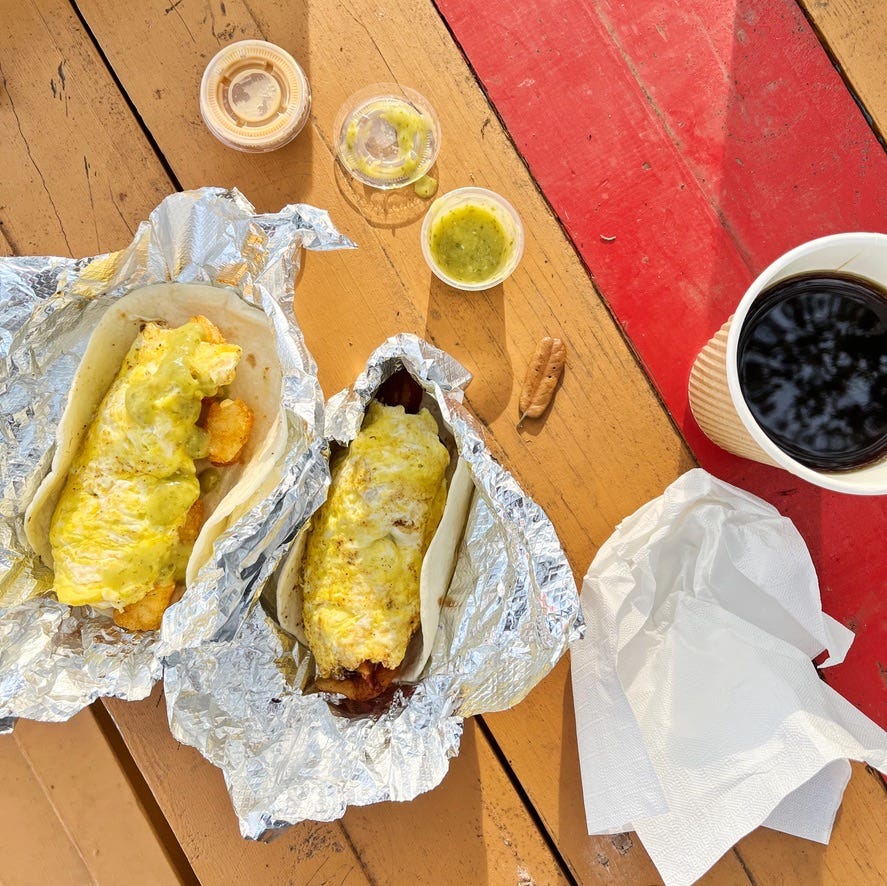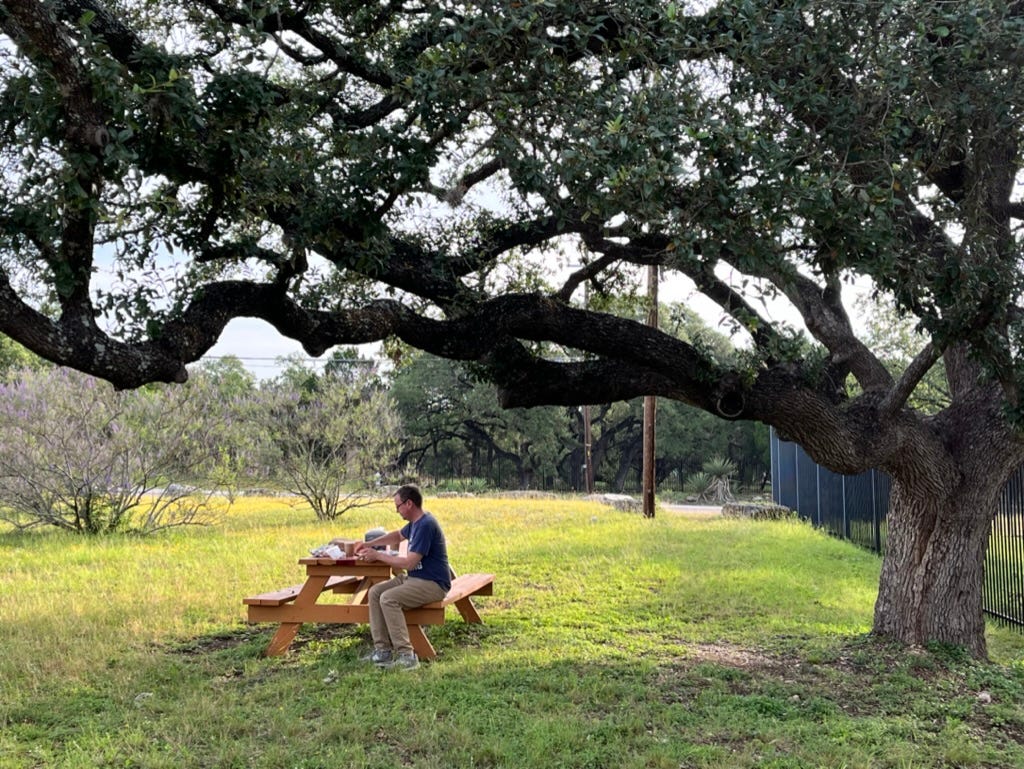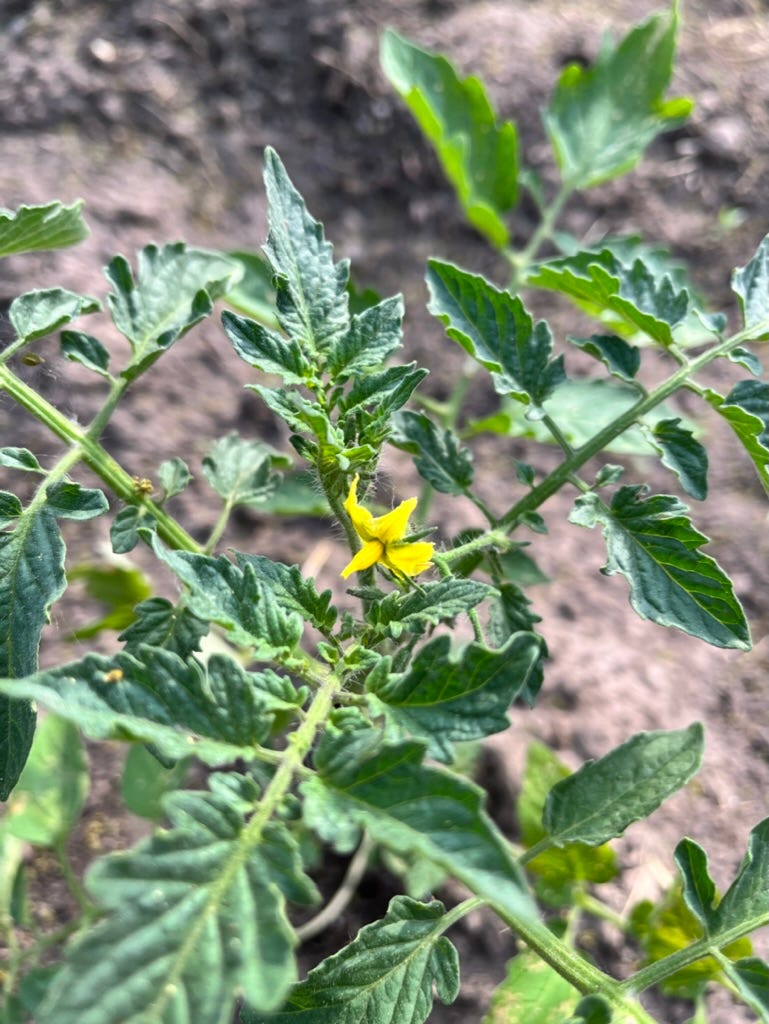Please Hold
Some fragmented thoughts on a Nickel Creek concert, the song "Holding Pattern," the enduring glory of love, breakfast tacos, and help with my writing
Saturday, June 10
Grand Rapids, Mich.
We went to an outdoor concert with friends the other evening. The smoke from the fires in Canada hadn’t yet arrived; the haze was all onstage fog machine. As the otherwise-clear air gradually cooled to crisp, we were enfolded in the woven warmth of fiddle and guitar, marvelous mandolin and gorgeous voice: Nickel Creek.
If, when you read “Nickel Creek,” your mind devilishly said, “Nickelback,” you’re not the only one. But surely you have enough respect for me that you know I’d never go to a Nickelback concert.
I love Nickel Creek’s story. Growing up in the San Diego suburbs in the late 1980s, siblings Sara and Sean Watkins formed a band with their friend and neighbor Chris Thile. Unlike most childhood bands, this one endured and flourished, becoming one of the foremost modern-bluegrass groups in the U.S. Later, even as their own individual careers took off, they returned to one another. On and off for more than thirty years, they’ve made music together—most recently, the album Celebrants, which was released a few months ago.
Marked by flashes of dissonance, smoothed by the band’s characteristically gorgeous harmonies, and suffused with musical intricacy, Celebrants is Nickel Creek’s first album in nine years. It isn’t the easiest, most-radio-friendly listen. This is by design. Themes interweave, later tracks offering codas to earlier ones. “The way that people listen to music now is so fragmented. We get things in fits and starts,” Thile said recently. This album asks to be experienced as a coherent whole; in its layered storytelling, Celebrants wonders whether there might not be another, perhaps even better, way.
Connection is one key recurring theme on the album—fitting for a work that came together during the pandemic. “Strangers” feels like a poem about enduring friendship, knit from snippets of conversation among old confidants: “Are you hanging in there?” “Are the kids all right?” “Remember that one time?” “It’s been too long.” “Water Under the Bridge,” a striking pair of minute-long tracks, summons intense vulnerability, “the darker the secret, the more enlightening the story.” Then, later: “Listen to us, trying to listen, to more and more life in these eddies, in our water under the bridge.”
But the connections that Nickel Creek gently prods its listeners to consider aren’t just the ones we’ve forged with those we like. All three musicians grew up evangelical Christians; all have since experienced shifts in worldview and spirituality. On “Goddamned Saint,” Thile sings about an unnamed musician who “wrote like a sinner/ As far as I could understand,” but whose unexpected witness stirred his wondering: “I watched/ As he walked the walk/ Like a goddamned saint.” “Can we get back, somehow, to that naive place when we would enter into a conversation with someone we disagree with in good faith?” Thile asked in an interview with NPR. “Because that’s how we got to these convictions that we have now and hold so dear and treat as being so sacred. Can we still do that?”
This is one gift that good music can offer: It can wow us, yes. Meanwhile, it can help us wonder. It can create space, opening us up to perspectives beyond us. Perhaps it does so most effectively when we’re held by the strength of its diverse beauty: Nickel Creek never allows the disorientation of dissonance to linger for too long.
At the end of the show, the band played a song that captured me at first not with its mournful melody nor with its lyrics but with the sharp, clean, pure sound of Thile snapping his fingers. Thile is a multitalented virtuoso: a phenomenal mandolin player, a winsome vocalist, a quirky and funny presence onstage. If he weren’t such a winning performer, it might even annoy me how good he is at what he does. I turned to my friend Ron and said, “He even snaps his fingers better than other people do.”
The song was “Holding Pattern.”
Here in your arms
a chorus of alarms
sounding like vespers
What if a holding pattern isn’t stasis so much as it is active, even vigorous waiting?
Here in your arms
a chorus of alarms
sounding like vespers
“Holding” can mean constant movement, up above as well as down below—an aircraft circling until conditions change.
Glory to any true love
as it once was
as it is now and just might have to be forever
Any true love—
Sometimes we are held by a memory, by a moment, by a feeling of knowing and being known, of loving and being loved. That memory, that moment, that feeling, can be as powerful and as real later as it was then.
Glory to any true love
as it once was
as it is now and just might have to be forever
I heard in those lyrics an echo of the Gloria Patri. A reassuring fixture of so many time-honored liturgies, it has telegraphed to so many congregations—to so many believers, as well as those who are just trying to believe—the enduring yet diverse presence of the trinitarian God. God knows I have sung it not because I am sure it is true, but because I want it to be true.
Glory to any true love
as it once was
as it is now and just might have to be forever
When I heard the words “just might have to be,” I felt a twinge of sadness. Couldn’t they have sung “and will be forever”? But I also felt a pang of recognition, because I know that sense of… slight resignation? This is what we’ve got. There is no certainty—hope, perhaps, but no certainty—of what comes after, or of more.
But maybe that’s enough.
I think of friendships that have faded. That fading doesn’t dim the luminosity of what was, even if the heat has shifted, perhaps flaring into anger and then settling into a gentler simmer.
I think of relationships that have changed. That change doesn’t negate the beauty of what was—surely its mark never disappears—and it doesn’t preclude the possibility of what might still come.
I think of bonds that are still evolving. That evolution doesn’t alter the goodness of what was, not if it was true—which is to say not just real and faithful but also honest.
Glory to any true love
as it once was
as it is now and just might have to be forever
That these words from “Holding Pattern” are tucked into the middle of this Nickel Creek album seems right, given that this is music for the middle of a journey. “This is just the stuff life is made of,” Sara Watkins said in an interview with the Bluegrass Situation after the album was released. “There’s all the wonderful stuff, and then there’s the mess. There’s that middle part of relationships that we often skip through. It’s not as sexy as the beginning or as devastating as the end. But it’s the bulk of life.”
In that interview, Watkins mused about why it’s often so difficult for us to dwell in the reality of that messy middle. We skitter past, she suggested, because “we’re allergic to the idea of friction.”
So often, we reflexively recoil from friction, like a hand touched by the shock of static electricity. Yet Watkins also noted that friction can be generative. It can produce transformative energy, whether it’s a pen to paper, your hands rubbing against each other in winter, or a safety match meeting phosphorus. “That’s where the warmth comes from,” she said.
Glory to any true love
as it once was
as it is now and just might have to be forever
Any true love—
Isn’t that the only thing that will get us through, the only thing that reminds us that we’re not alone, the only thing that sustains us amidst disorientation and longing, the only thing that walks us through discomfort and perceived danger?
“Holding” can also mean a steadying embrace. In any true love, surely there is a touch of the divine. And in that generous act, in that gift of being strengthened by care beyond yourself, perhaps new things are possible. That idea doesn’t scare you so much. That threat registers instead as invitation. That chord rings differently.
Glory to any true love...
That’s a doxology, and that’s a benediction.
What We’re Eating: Someone asked me the other day how it is that we seem to eat well wherever we go. Do we have some strange superpower that draws us to good food? I wish! Our overriding philosophy when we travel is that we don’t want to waste a meal on bad food. No empty calories.
When I’m doing meal planning, I really only have one key tool. It’s called Google. So, for instance, when we were in Texas earlier this week to spend a couple of days with Tristan’s dad, we were staying outside Austin and didn’t have time to go to any of our usual breakfast favorites. The day before, we’d had breakfast at Summer Moon, quite a decent coffee place, but its breakfast tacos come from Tacodeli—fine, but nothing memorable. So I typed “breakfast tacos” into Google Maps, I filtered out everything rated under 4.5 stars (Tristan thinks 4+ is safe, but why lower our standards, especially for breakfast tacos?), and I clicked on each possibility within a 5-mile radius.
The one that caught my eye was Jefeberto’s Taco Shack, a truck with 114 reviews and a stellar 5.0 average. That seemed unnaturally high to me. But cross-referencing is key: Jefeberto’s also got a solid 5 on Facebook, but only 10 ratings—questionably low. On Yelp, it also averaged 5 on Yelp, where it had decidedly more reviews. There was nothing else in the vicinity that rated that highly, so off we went.
Jefeberto’s was very good, though I don’t know that I’d give it a 5. In our household, we are firm enemies of grade inflation, and in Austin proper, there are a few places that are better (El Primo is my favorite). The tortillas could have been warmer and more charred. But Jefeberto’s does score bonus points for the completely nontraditional but absolutely delicious egg and tater-tot taco; the generous amount of filling; the very fine habanero salsa; and the lovely Texas live oak under whose generous branches we sat for our meal.
Definitely not a wasted meal—and by my accounting, a good use of the 10 minutes it took to complete the entire research process. Please let Google be your friend.
In the garden, the beans are growing slowly, the potatoes look robust, and the tomatoes seem fine, though I might have lost one to last week’s wicked heat. In the study, the writing proceeds very slowly. I’m chipping away at three Travel+Leisure stories and I’m inching my way through my book, Good Soil, which recounts my time as a farmhand at the Farminary and will come out, God willing, in 2025.
That leads me to one last thing: My manuscript is due at the end of September and writing is such a lonely process sometimes. First, please send me all your positive vibes and heartfelt prayers. Secondly, would any of you be interested in being draft readers? I’m looking for a handful of people who would be willing to cast a constructively critical eye over a chapter or two each in coming months. I’m serious when I ask for a constructively critical eye: I am not a writer who resents editing. I genuinely want to know if something doesn’t make sense, bores or confuses the reader, or simply doesn’t work. While I can’t compensate you in cash money, I promise I will find a way to honor your contributions. If you’d be interested, please email me at makebelievefarmer@gmail.com.
That’s all I’ve got this week. What’s on your minds?
As ever, I’m so grateful we can stumble through all this together, and I’ll try to write again soon.
In hope and with gratitude,
Jeff






Just here to let you know that I read the subject line so many times, and read "nickleback" and actually didn't click to read this right away because I was a bit confused about reading about nickleback thoughts.
glad i finally got that sorted out.
Active waiting. Deeply resonating these days. Appreciate you!
Thank you for your post. This post gave lovely words and truthfulness about Nickel Creek! My daughter introduced them to me (and her father) in 2000. Many road trip miles with Nickel Creek has happened since then. Her father died last year however she and I thoroughly enjoyed being at the June 2 concert at The Eastern, Atlanta! Oh my gosh!